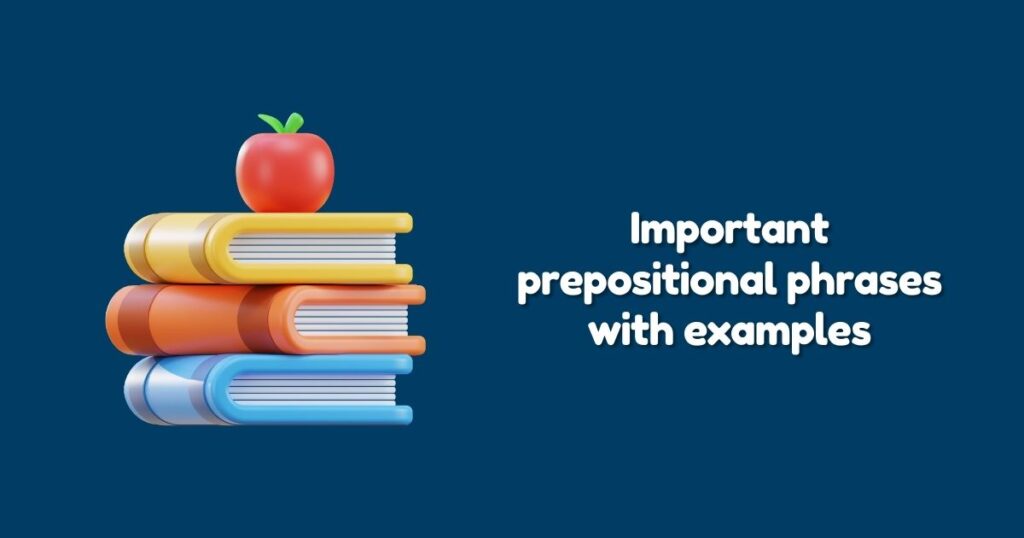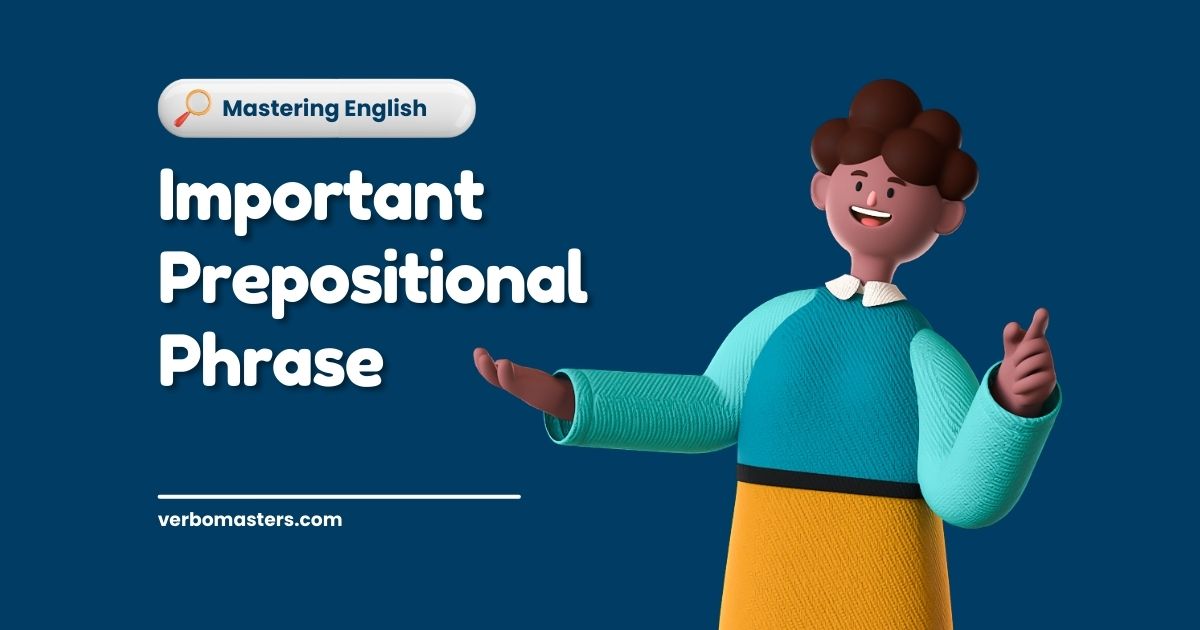Prepositional phrases are small groups of words that start with a preposition and add more detail to a sentence. They often tell us when, where, or how something happens. These phrases help make writing clearer and more interesting.
You’ll often find them in everyday speech and writing, like “under the table” or “after the meeting.” They usually include a preposition and a noun or pronoun. Knowing common prepositional phrases can boost your grammar skills and make your sentences flow better.
You can also read; 200 List of Preposition and Example
Important prepositional phrases with examples

200 important prepositional phrases with easy-to-understand examples. These phrases will help make your sentences clearer and more expressive.
- According to – According to the news, it will rain today.
- Ahead of – She arrived ahead of time.
- Along with – He came along with his friend.
- Apart from – Apart from math, he enjoys science.
- As for – As for your idea, it sounds great.
- As of – As of today, the rule has changed.
- As per – As per the schedule, we’ll leave at 9.
- As to – There’s no clue as to why he left.
- As well as – She sings as well as dances.
- Away from – Stay away from the fire.
- Because of – The match was canceled because of rain.
- By means of – He opened the box by means of a key.
- By virtue of – She succeeded by virtue of her efforts.
- By way of – He came by way of the old road.
- Close to – The hotel is close to the airport.
- Contrary to – Contrary to popular belief, cats love company.
- Due to – The game was delayed due to weather.
- Except for – Everyone passed except for John.
- Far from – The house is far from school.
- For fear of – He avoided the topic for fear of upsetting her.
- In addition to – In addition to coffee, we have tea.
- In case of – In case of fire, call this number.
- In charge of – She is in charge of the project.
- In comparison with – Prices are low in comparison with last year.
- In connection with – The police acted in connection with the case.
- In contrast to – In contrast to summer, winter is quiet.
- In exchange for – He gave his toy in exchange for a book.
- In favor of – They voted in favor of the new law.
- In front of – The car is in front of the house.
- In honor of – A statue was built in honor of the hero.
- In line with – The decision is in line with our values.
- In need of – The dog was in need of care.
- In place of – I used honey in place of sugar.
- In respect of – This letter is in respect of your request.
- In search of – They went in search of adventure.
- In spite of – He smiled in spite of the pain.
- In terms of – In terms of quality, it’s excellent.
- In view of – In view of the situation, we stayed home.
- Instead of – We ate fruit instead of candy.
- Next to – The lamp is next to the bed.
- On account of – The school closed on account of snow.
- On behalf of – I spoke on behalf of the team.
- On the basis of – We selected players on the basis of skill.
- On the grounds of – He was fired on the grounds of misconduct.
- Out of – The milk is out of the fridge.
- Out of fear – He ran away out of fear.
- Prior to – Wash hands prior to eating.
- Regardless of – We’ll go regardless of the weather.
- Thanks to – Thanks to you, we made it on time.
- With regard to – With regard to your request, it’s approved.
- According with – His actions were according with the rules.
- Alongside of – He sat alongside of his brother.
- Apart from that – Apart from that, everything’s fine.
- As against – The cost is low as against value.
- At the back of – The garden is at the back of the house.
- At the beginning of – We met at the beginning of the event.
- At the bottom of – The key is at the bottom of the bag.
- At the end of – We clapped at the end of the play.
- At the expense of – He won at the expense of health.
- At the foot of – They sat at the foot of the mountain.
- At the hands of – The defeat came at the hands of rivals.
- At the height of – He rose to fame at the height of his career.
- At the top of – The ball was at the top of the shelf.
- At odds with – He was at odds with his brother.
- At risk of – The building is at risk of collapsing.
- At the time of – He called at the time of dinner.
- At war with – The countries are at war with each other.
- Because of that – Because of that, we had to cancel.
- Before the end of – Finish it before the end of the day.
- Behind the scenes – She worked behind the scenes.
- Beneath the surface – Beneath the surface, there’s more.
- Beside the point – That’s beside the point.
- Beyond belief – The news was beyond belief.
- By accident – I broke it by accident.
- By choice – She is single by choice.
- By law – He must wear a helmet by law.
- By mistake – I sent the email by mistake.
- By nature – He is kind by nature.
- By surprise – The storm hit by surprise.
- By the side of – She sat by the side of the river.
- By the time of – He arrived by the time of dinner.
- By your side – I’ll always be by your side.
- For the benefit of – He did it for the benefit of all.
- For the purpose of – It’s built for the purpose of safety.
- For the sake of – He worked hard for the sake of his family.
- From behind – The dog barked from behind the fence.
- From now on – From now on, I’ll be early.
- From the bottom of – He thanked us from the bottom of his heart.
- From the top of – He shouted from the top of the tower.
- In all honesty – In all honesty, it was boring.
- In between – The pen is in between the books.
- In charge of – He is in charge of the event.
- In comparison to – He is strong in comparison to his age.
- In contact with – Stay in contact with your friends.
- In detail – He explained it in detail.
- In exchange for – She gave it in exchange for candy.
- In light of that – In light of that, we changed our plan.
- In memory of – A bench was placed in memory of her.
- In no time – We’ll be there in no time.
- In place of that – Use this in place of that.
- In question – The matter in question is still unresolved.
- In relation to – His comments were in relation to the topic.
- In return for – I cooked dinner in return for his help.
- In short – In short, we need to leave now.
- In spite of that – In spite of that, we tried again.
- In the absence of – In the absence of rain, the crops died.
- In the case of – In the case of fire, use the stairs.
- In the course of – In the course of the talk, he revealed the truth.
- In the event of – In the event of delay, call us.
- In the face of – He stood firm in the face of danger.
- In the form of – He paid in the form of coins.
- In the interest of – The meeting was canceled in the interest of safety.
- In the light of – In the light of new data, we adjusted the report.
- In the middle of – I called in the middle of the night.
- In the name of – They fought in the name of freedom.
- In the presence of – Don’t lie in the presence of your parents.
- In the shape of – It’s a cloud in the shape of a dragon.
- In the wake of – In the wake of the storm, trees were down.
- Inside of – The keys are inside of the drawer.
- In view of that – In view of that, we made changes.
- Just like – She sings just like her mom.
- Near to – The store is near to the station.
- On a mission to – He’s on a mission to help the poor.
- On account of that – On account of that, he stayed home.
- On the edge of – The cat sat on the edge of the table.
- On the floor of – The bag was lying on the floor of the room.
- On the part of – It was an error on the part of the staff.
- On the point of – He was on the point of leaving.
- On top of that – On top of that, he brought dessert.
- On your behalf – I spoke on your behalf.
- Out from under – He got out from under the pressure.
- Out in front of – The flag flew out in front of the building.
- Outside of – The kids played outside of the school.
- Over and above – Over and above all, he is honest.
- Right next to – The phone is right next to you.
- Round about – They live somewhere round about the station.
- Side by side with – She worked side by side with her mentor.
- Similar to – This song is similar to the last one.
- Subsequent to – Subsequent to the meeting, we made changes.
- Such as – I love sports such as football and tennis.
- Thanks to that – Thanks to that, we finished early.
- To the left of – The cafe is to the left of the bank.
- To the right of – The exit is to the right of the hallway.
- Together with – He completed the task together with his team.
- Under control – The fire is now under control.
- Under pressure – He performs well under pressure.
- Under the impression – I was under the impression you left.
- Under the table – The toy is under the table.
- Up against – We’re up against a strong team.
- Up to – It’s up to you to decide.
- Up with – I’m fed up with the noise.
- Upon completion of – Upon completion of work, take a break.
- With a view to – He trains with a view to winning.
- With an eye on – She saves with an eye on the future.
- With the aid of – He climbed with the aid of a rope.
- With the help of – I passed with the help of my tutor.
- Within reach of – The snack was within reach of the baby.
- Within the bounds of – Stay within the bounds of the law.
- Without a doubt – He is without a doubt the best.
- Without delay – Please respond without delay.
- Without regard to – He acted without regard to the rules.
- Without warning – The storm hit without warning.
- Along the lines of – Think along the lines of creativity.
- At full speed – The train moved at full speed.
- At the heart of – Trust is at the heart of the issue.
- At times – Life can be hard at times.
- By chance – We met by chance at the market.
- By day – She works by day, studies by night.
- By night – The city shines bright by night.
- For example – I like pets, for example, dogs and cats.
- From time to time – I visit her from time to time.
- In a hurry – We left in a hurry.
- In favor of that – I’m in favor of that idea.
- In other words – In other words, be careful.
- In the past – In the past, we lived there.
- In time – I arrived just in time.
- On foot – He goes to school on foot.
- On purpose – He did it on purpose.
- Once again – Once again, thank you.
- Over time – Habits form over time.
- Since then – I haven’t seen him since then.
- To begin with – To begin with, let’s review the basics.
- To some extent – I agree to some extent.
- Until now – Nothing has happened until now.
- With confidence – She spoke with confidence.
- With love – The gift was packed with love.
- With speed – He ran with speed.
- Within a minute – He came back within a minute.
- Within reason – I’ll help you within reason.
- Without question – That’s the truth without question.
- At hand – Keep your phone at hand.
- Before long – He’ll be home before long.
- By your leave – By your leave, I’ll go now.
- Down the road – We may move down the road.
- For a while – Stay here for a while.
- From this point – From this point, keep straight.
- In general – In general, I like it.
- On hand – Help is on hand.
- Out of the blue – He showed up out of the blue.
- With ease – She passed with ease.
FAQs
What is a prepositional phrase?
A prepositional phrase is a group of words starting with a preposition and ending with a noun or pronoun, used to add detail to a sentence.
How do prepositional phrases function in a sentence?
They provide additional information about time, location, direction, cause, manner, or condition.
Can a sentence have more than one prepositional phrase?
Yes, many sentences contain multiple prepositional phrases to give more context or detail.
What are common prepositions used in phrases?
Common ones include in, on, at, by, under, over, after, before, with, and between.
Do prepositional phrases always come at the beginning of a sentence?
No, they can appear at the beginning, middle, or end of a sentence.
Are prepositional phrases the same as adverbial phrases?
Not always, but some prepositional phrases act like adverbs when they describe how, when, or where something happens.
Can a prepositional phrase act as a subject?
No, a prepositional phrase cannot be the subject of a sentence, but it can modify or give more info about the subject.
What is the object of a preposition?
It’s the noun or pronoun that follows the preposition and completes the phrase.
Can prepositional phrases be removed from a sentence?
Yes, and the sentence may still be grammatically correct, but it could lose important detail or clarity.
How can I identify a prepositional phrase?
Look for a preposition followed by a noun or pronoun that doesn’t contain a verb.
Conclusion
Prepositional phrases are small groups of words that start with a preposition and give extra details in a sentence. They help describe time, place, direction, and more. For example, “under the table” tells us where something is.
These phrases are helpful in both writing and speaking. They add depth and clarity without making sentences complicated. You can find them in almost every kind of sentence you read or hear.

I’m John Smith, a language enthusiast dedicated to helping writers, students, and professionals master the art of clear and effective communication. Whether you’re looking for grammar tips, writing guides, or common mistake corrections, you’ll find valuable insights to improve your language skills. Let’s make grammar simple and fun!

